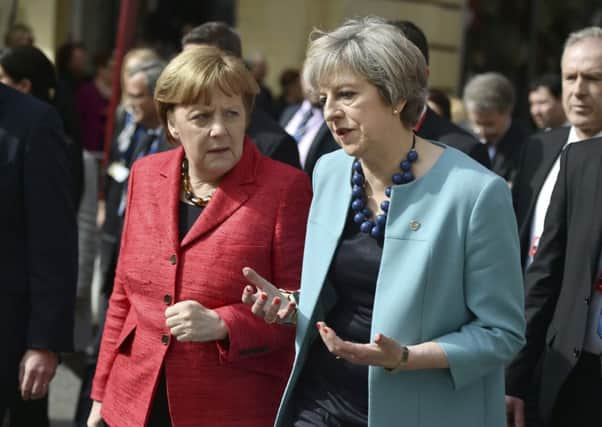May tells Europe's leaders to work '˜constructively' with Trump


The Prime Minister told fellow leaders at an EU summit in Malta to deal with Mr Trump “patiently and constructively” despite growing disquiet at the direction his administration is taking.
The EU responded with caution, voicing concern over policies including a controversial immigration and refugee ban and warning the US president they would not allow European values to be “trampled on”.
Advertisement
Hide AdAdvertisement
Hide AdAnd the offer from Mrs May – the only world leader to meet the US president since his inauguration – to act as a bridge between Mr Trump and Europe was rebuffed, with Lithuanian prime minister Dalia Grybauskaitė saying: “I don’t think there is a necessity for a bridge. We communicate with the Americans mainly on Twitter.”
The summit in the Maltese capital Valletta was Mrs May’s first chance to meet EU leaders face-to-face since delivering a major speech setting out her Brexit strategy two weeks ago, and putting it on paper in a document published on Thursday.
The Prime Minister sought to convince European allies in Malta that the UK will remain a “reliable partner” after Brexit, telling partners she wants a “new, positive and constructive” relationship with the EU.
Mrs May held a series of one-to-one meetings with European heads of government to update them on her plans, but one key meeting did not go ahead after a planned bilateral session with German chancellor Angela Merkel was cancelled. Aides said the two leaders had had the chance to speak during a walking tour of Valletta’s medieval ramparts.
Spanish prime minister Mariano Rajoy, who did meet Mrs May, said the UK Prime Minister’s speech had “clarified many things” about how the UK would enter Brexit negotiations.
Doubts remain, however, with the Italian deputy foreign minister Mario Giro calling the UK government’s white paper a “wish list, with no precision on how to handle it” on the eve of the gathering.
As has become customary since the Brexit vote, Mrs May left the summit after the morning session to allow the other 27 leaders to discuss the EU’s future without the UK.
Advertisement
Hide AdAdvertisement
Hide AdSecurity was also on the agenda, with the Prime Minister urging allies to meet a Nato defence spending commitment of 2 per cent of GDP.
The target has become even more pressing since Mr Trump’s election. The US president has demanded European allies share more of the burden of protecting the continent.
Mr Trump’s claim that Nato is “obsolete” and his apparent friendliness with Russian president Vladimir Putin are two of the main reasons for anxiety among EU leaders.
The Prime Minister’s claim to have secured a “100 per cent commitment” to Nato on her recent visit to Washington DC was questioned by French president François Hollande, who said: “Who knows what the US president really wants, particularly in relation to the Atlantic alliance and burden-sharing?”
In a letter to member states ahead of the summit, European Council president Donald Tusk labelled the new US administration a “threat” to unity on the Continent. There have been calls for Mr Trump’s pick as US envoy to the EU, Ted Malloch, to be rejected after he suggested he wanted to see the bloc collapse.
Mr Malloch called for a cooling of rhetoric yesterday, but added fuel to the fire himself, saying of the EU: “It’s an overly complex, fairly bloated bureaucratic organisation … its ambitions have basically overstepped its capabilities.”
Austrian chancellor Christian Kern, who also held a one-to-one meeting with Mrs May, said EU leaders had “mixed feelings” about the Trump administration, calling his travel ban for seven Middle East and North African countries “highly problematic”.
In a press conference following the summit, Malta’s prime minister Joseph Muscat said the EU’s response must be to “lead at a global level”.
Advertisement
Hide AdAdvertisement
Hide AdSumming up the mood, Mr Muscat said: “There was no sense of anti-Americanism. There was a sense that we need to engage with the United States just the same, but that we need to show … that we cannot stay silent where there are principles involved.
“As in any good relationship, we will speak very clearly where we think that those principles are being trampled on.”
In Valletta, the Prime Minister also unveiled a £30 million package of support for migrants and refugees in Greece and across the Mediterranean region.